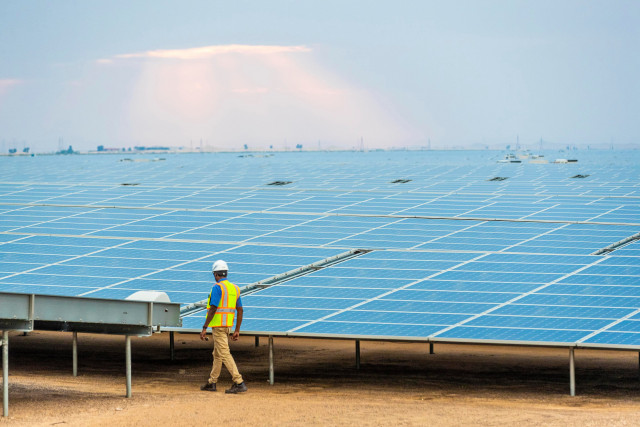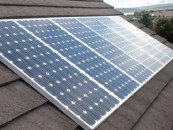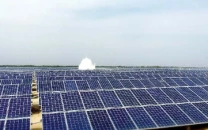The battle over solar power pricing
Navigating the balance between renewable energy ambitions and economic viability

Net metering, also referred to as net energy metering (NEM), is an electricity billing method enabling consumers generating their own power to utilise it at any time, rather than solely when it’s generated.
It involves customers with solar panels transferring excess electricity they produce to the grid, receiving credits from the utility company on their electric bill. When solar panels generate more electricity than consumed, the surplus power flows back to the grid.
According to the World Bank, Pakistan boasts a solar power potential of 40GW and aims to source 20% of its electricity from renewables by 2025. Historically dependent on fossil fuels, especially oil and gas, for power generation, Pakistan’s energy mix has seen shifts in recent years.
As per the Pakistan Bureau of Statistics (PBS) data from 2020, fossil fuels constituted roughly 63% of total power generation, followed by hydropower at 29%, nuclear energy at 5%, and renewable energy at approximately 3%.
The government has endorsed the Alternative and Renewable Energy Policy 2019, offering incentives and support for renewable energy ventures.
Challenges persist in executing the National Electricity Policy 2021, ratified by the Council of Common Interests in February 2021. Despite aiming to ensure affordable, reliable, and sustainable electricity, resistance from certain provinces and stakeholders on matters like tariff determination and power sector governance hindered its implementation.
The increasing appeal of solar energy as an investment signifies a pivotal shift in Pakistan’s power generation dynamics. With abundant solar resources, Pakistan can diminish reliance on fossil fuels, bolster energy security, and promote environmental sustainability.
Reports indicate that the government plans to decrease the rate of solar power exported to the national grid from Rs21 per unit to Rs11 per unit, sparking widespread criticism. Currently, consumers generating solar power through net metering receive Rs21 per unit.
The installed capacity of solar net metering has surged to 3,000 megawatts, with projections indicating further growth next year. Despite public concerns, the government cites the financial strain of capacity charges paid to Independent Power Producers (IPPs), regardless of whether electricity is purchased from them.
This proposed rate reduction is believed to be influenced by IPPs, who fear loss of revenue with the rapid increase in solar power installations, potentially at the expense of consumers. Notably, regulatory bodies like the National Electric Power Regulatory Authority (Nepra) are perceived to favour IPPs over consumers and solar net metering users.
The surge in demand for solar panels has disrupted the government’s capacity payment plan. While the government contends that the current rate enables consumers to recoup their solar panel installation costs within 18 months, Independent Power Producers (IPPs) are pushing for an extension of this payback period to 10 years.
Globally, the Sustainable Energy for All (SE4All) initiative aims to achieve universal access to modern energy by 2030 and double the share of renewable energy and energy efficiency gains. Consequently, there’s a rapid transition towards renewable and alternative energy sources for power generation.
The EU’s revised Renewable Energy Directive elevates its binding renewable target for 2030 to a minimum of 42.5%, up from the previous 32%, with an ambition to reach 45% of total energy from renewable sources, nearly doubling the existing share. Similarly, other advanced countries are also committed to increasing the proportion of renewable energy in their energy mix by 2030.
Sustainable Development Goal 7 (SDG7) advocates for “affordable, reliable, sustainable, and modern energy for all” by 2030, with three core targets forming the foundation of this endeavour: ensuring universal access to affordable, reliable, and modern energy services.
Pakistan has ratified the United Nations Convention on Climate Change (UNFCCC) and adopted SDG-7 to align with global efforts in combating climate change and transitioning away from traditional fossil fuels and other carbon-intensive energy sources.
To meet its Nationally Determined Contribution (NDC) target, Pakistan aims to transition to 60% renewable energy and achieve a 30% penetration of electric vehicles by 2030. Additionally, Pakistan plans to ban coal imports and expand nature-based solutions.
Solar net metering stands out as a rapidly growing sector, offering consumers the opportunity to leverage their own resources for energy generation. Through initiatives like solar net metering, Pakistan can fulfil its commitments under the Paris Agreement, UNFCCC, and SDG-7.
Keeping in view the above national and global commitments, leveraging net metering facilities can significantly aid in fulfilling Pakistan’s obligations under the UNFCCC and Paris Agreement. Therefore, reducing the per-unit price of solar energy from Rs21 to Rs11 could undermine the entire transition to renewable energy.
The government should reconsider its decision, as it risks jeopardising the progress toward sustainable energy. A comprehensive review, involving input from market experts and the relevant Ministry of Climate Change, as well as consultation with solar consumers, is imperative.
It’s crucial to assess the broader national and global dynamics before making any unilateral decisions. To uphold Pakistan’s international legal obligations, safeguard the interests of its citizens, and maintain momentum in transitioning to renewable energy, a thorough consideration and review process are essential.
THE WRITER IS A CLIMATE CHANGE, FORESTRY, AND ENVIRONMENT EXPERT
Published in The Express Tribune, May 6th, 2024.
Like Business on Facebook, follow @TribuneBiz on Twitter to stay informed and join in the conversation.






























COMMENTS (2)
Comments are moderated and generally will be posted if they are on-topic and not abusive.
For more information, please see our Comments FAQ